Crossing into Ethiopia was like descending onto another planet. After half a year in Muslim countries I was going to meet Christian majority again. After four months the Arabic language was there no more. And after 4000km of mostly flat Sahara and its surroundings, I was about to meet real mountains again. But while we sorted out all the border paperwork, the most exciting thing was the prospect of drinking a cold beer legally and with full acceptance of the community. We had been planning to do it at the first bar available, but the busy and unpleasant atmosphere of the border town made us cycle to the next village some 30km ahead. Being also stupid enough not to check if we needed water, under the midday sun and across many hills we arrived to the destination totally dehydrated. One small beer sent us out to the orbit. Just enough to give up in the next town and get into a hotel.
In Ethiopia everything seems different than anywhere else and so is the food. Everything boils down to the word injera. That huge, sour and spongy pancake, a feeling of which resembles a moist bathroom mat, is made out of teff, a grain cultivated almost exclusively in the Horn of Africa and Yemen. It usually comes in three kinds. The basic one is shiro, just an injera with a hell-spicy sauce on top. The better one is topped with a selection of cooked vegetables, sometimes containing such delicacies as red beet. The hardcore version is firfir, an injera with yesterday injera, shredded and soaked in the hot sauce. Locals tend to eat firfir as a breakfast, but we were never desperate enough to order it. After two shiro, followed by a beer, Alex felt quite bad and we finished exploring the culinary secrets of the new country.
In the morning his condition seemed to be better, despite the close proximity of a church, which did not let us sleep well. While travelling in Muslim countries, many people complain about the morning adhan, which often happens about 5AM. That short break of silence is nothing when compared to Ethiopian Orthodox mass. The ceremony lasts for three hours and consists mostly of moans and wails of the priests, amplified of course. Despite all the respect for other cultures, we were often unable to stay serious while hearing the sounds they made (which had been also the case with many of the muezzins, especially in Egypt). The biggest joke, however, is that the participants probably understand as much as we do, because the liturgy is done in archaic ge’ez language, which has not been spoken by Ethiopians for ages. The mass started around 4AM, but as we would learn, it was not the earliest one.
Alex was better, but not enough to accept another injera for the breakfast. Bananas were the only option available in the town, but even eating them he requested a break some 20km later and we sat under a tree.
The situation was not getting better and actually he was feeling worse as the time passed. Finally, in the late afternoon we realized that nothing could be done with the medicine our first-aid kits contained, and we packed the bike on the top of the first passing minibus. Alex crawled inside and went to Gonder, the first bigger city, in order to seek medical assistance.
Just on the third day of cycling together we were separated again. I followed the bus, but managed to cycle just 45km more before the darkness forced me to camp near the road. Soon Alex called me to say that he was in a hospital, getting better under a drip. Too much injera and beer had apparently shocked his stomach, but nothing dangerous happened.
The next morning I woke up before the sun, in order to get to Gonder on the same day. I had to cover about 100km across hills and mountains, while climbing to the Abissinian Highland some 1500m above. The total uphill on that day remains a mystery for me, but it was one of the most physically demanding rides of my life. The main climb, which I began early and without a breakfast, made me complete an impressive distance of 22km just before 2PM. Then a friendly tuk-tuk driver, seeing my struggle and total exhaustion, offered to pull me for a few hundreds of meters, up to the top of the last big hill. Being dragged there so quickly was fun, but releasing the vehicle at the top I lost my balance and met personally with the Ethiopian asphalt. With few bruises and scratches, a leg stabbed by my own bike lock key, and with the trousers torn in numerous new places I just wanted to have a lunch and rest, being glad that nothing had happened to the bike.
For the meal I stopped in Aykel, the last peaceful town in the country, as I would learn soon. I had been warned about Ethiopia many times and I guess that no cyclist ever had described that country as a pleasant place to cross, but until then I had no problems. The children usually greeted me with “you, you, you, you, you!” and sometimes followed running, occasionally asking for money, but nothing more. I could not know then, that the area close to the border was just very sparsely populated as for Ethiopian standards.
When I finally reached the plateau (which is actually far from being flat), more agriculture appeared. The trees were replaced by fields, and the beautiful birds and occasional monkeys – by kids wielding sticks and stones. For those shepherds, dressed in rags and bored by their work, a passing farenj is the attraction of the day. To the traditional “you, you, you” a broad variety of demands was added. Not only for money, but also t-shirt, water, pens and other stuff. In the country famous for long- distance runners the kids were able to keep up with me for hundreds of meters, just to be replaced by another ones in the endless relay. Fortunately, the famous stone throwing did not reach me, despite a few attempts to churl a pebble from a long distance, without any chance for success. As I soon learned, begging was not limited to the children. People in different ages shamelessly outstretched their hands and asked for cash, often pointing at their clothes, sometimes in quite good condition but usually very dirty.
While the daytime was coming to end and my destination still seemed to be far away, I raced across
countless hills. The interval effort of hard pushing uphill and short rests on downhills sapped all
energy from me. I was getting tired and more, more angry at the omnipresent beggars. The apogeum
came when a boy rushed from a nearby hut, holding a mug full of some drink in his hand:
“WAAAATER! GIVEE MEEE WAAAAAAAAAAATER!!!”, he yelled, trying to grab my bike.
“Why the hell you want my water? You have the damn drink in your hand!”, I shouted back.
“Give me waaaater!!!”, he continued, while running after me and splashing almost all the contents of
his mug onto the ground.
That was the moment when I thought about picking a stone and hitting the idiot hard, to shut him up. Quickly. One day and Ethiopians found where are the limits of my patience. “It’s not gonna be easy”, I said to myself.
Soon after the sunset I reached Gonder, to see Alex in almost perfect condition. We spent another day in the town, enjoying the best drinks the country would offer: coffee and thick fruit juices. The rest, however, was disturbed by the hotel manager. First the price for a double room, which we had agreed with a receptionist the previous day, rose almost twofold. After a long discussion we decided to pay a bit more, just to save us the effort of moving somewhere else. Soon another conflict emerged. In absence of water in our bathroom, I went to wash my clothes in the patio. The manager appeared soon after I had started, saying that washing was not allowed and I should use the service provided by the hotel (overpriced and slow, of course). An argument over stupid rules and the lack of water despite a high price of the room erupted quickly. Eventually, the bastard tossed my clothes on the floor. I jumped forward to punch his face, but he had been already surrounded by most of the staff, who stopped me. Fortunately, perhaps. Anyway, avoid Eweket Bir hotel if you happen to come to Gonder.
“This is really going to be tough”, I told myself.
The next two days we spent cycling to Bahir Dar. That meant two significant climbs in wonderful mountain scenery, and a lot of new beggar kids. Sometimes we had impression of being in some kind of video game, where nasty monsters spawn out of bush, ditches , attack in hordes from roadside houses or run across fields from far distance to intercept coming farenji. All of them seemed to be programmed to the same simple tune, just like cloned from one brain to another. “You, you, you, you, give me money/t-shirt/pen/water!”, was the usual phrase. “You, where are you GO?!”, occurred with similar frequency, with enormous emphasis put on the last, grammatically inappropriate word.
The phenomenon of that incorrectly assembled sentence, which seemed to be known and used by virtually every inhabitant of Ethiopia, still amazes me. I have no idea where they had learned it and how it had spread across all the country, but that question was shouted to a million of times, while only twice we would hear the proper form of “Where are you going?”
Bahir Dar welcomed us with another hotel manager trying to sell us an overpriced trip and since then our stay was marked by extortion attempts till the end. We paid a visit to the Blue Nile waterfall, where we discovered that Ethiopia also applies racist rules to tourism and – like in Egypt – foreigners pay more for the tickets. That clearly meant we would visit no more places with entrance fee. Smuggling the camera in, however, we paid the same amount as Ethiopians obtaining a photo permit (interesting way of squeezing money from visitors, anyway).
The biggest scam happened when we tried chat, a plant indigenous to Ethiopia, which is known to be a mild stimulant. Brought over to chat chewers’ den, we carefully checked the inflated prices. After chewing a lot of the weed, which did not cause any visible effect, we ordered a bill. The suspicion that our “guide” might feel invited by us was confirmed, but we cleared up that quickly. The surprise was an “entrance fee” item on the bill, amounting to about a half of the total amount. Being inside someone’s property and surrounded by manager’s friends put us in a weak position to negotiate. The money was a ridiculous amount in western standards, but quite significant in Ethiopia. We bargained long and hard, making the bastards talk a lot and lose nerves for every 8USD they got from us in total.
That incident, as well as numerous conversations on the streets with “friendly” people, reassured us that we should avoid any business, just to save our nerves. Deceit was the way, and after the lovely Sudan we had to refresh our lessons from Egypt’s tourist areas.
On the last night in Bahir Dar, two days after the calendar had announced beginning of the spring, first true rain came, marking the change of the seasons.

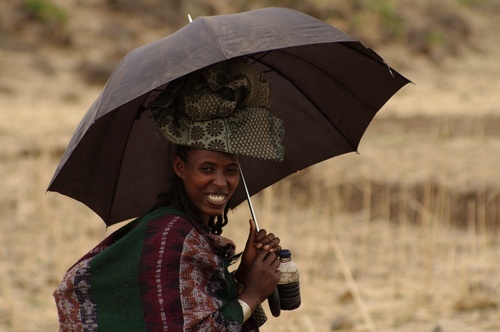
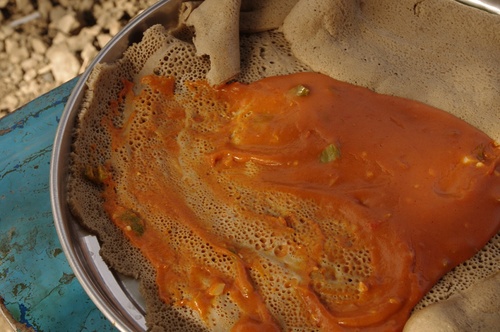
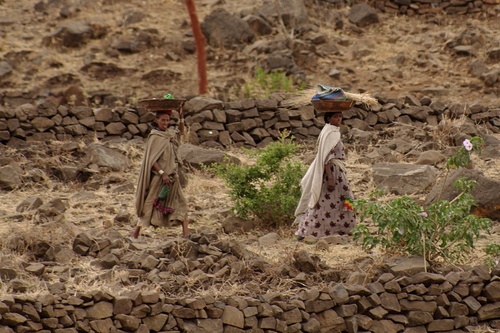
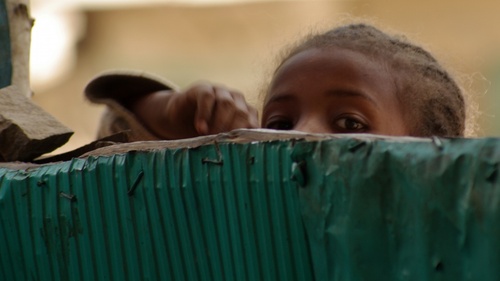
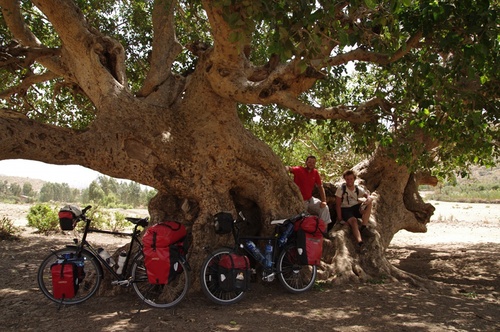
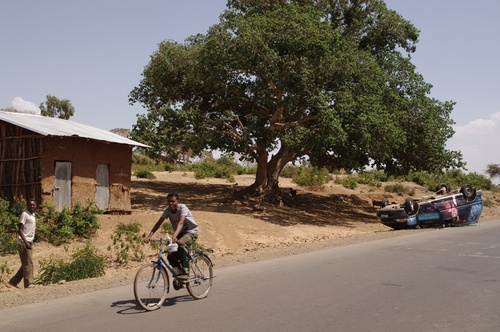
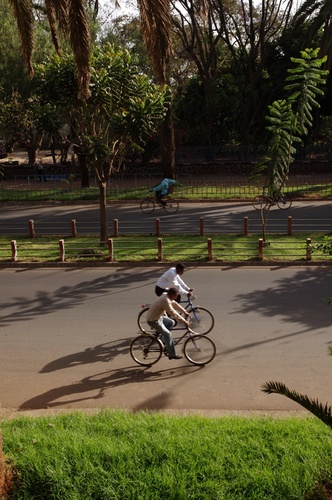
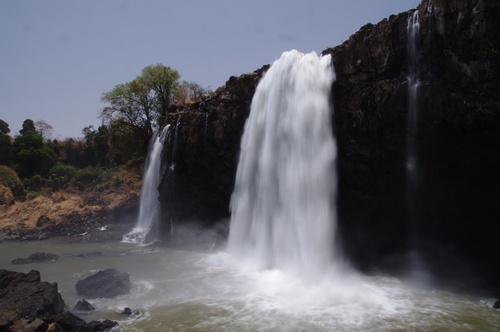
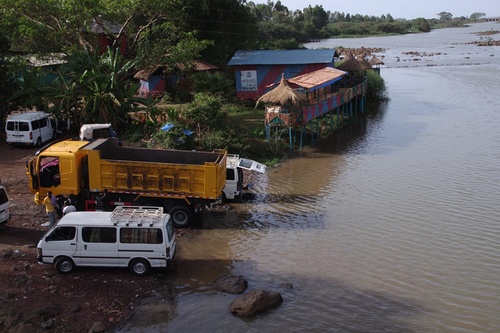
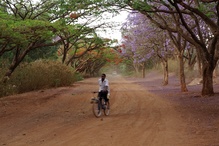
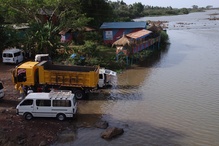
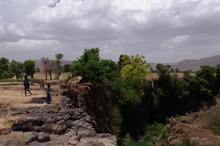
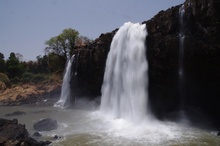

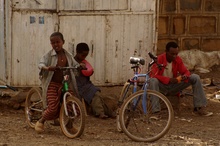
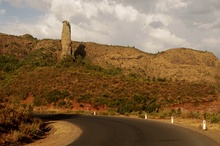
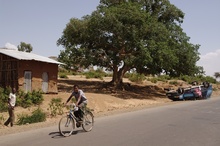
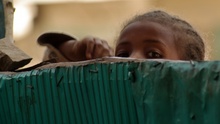
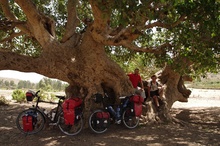
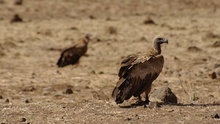
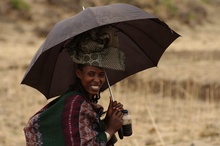
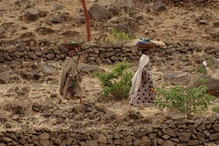
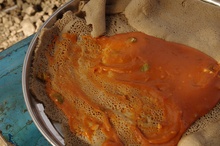
Comments:
mama
marg
Każdy wjazd do wioski, albo przejazd w pobliżu pasterskiej górskiej osady wiązał się z tym problemem...
Wystarczało hasło "słyszę dzieci", żebyśmy pospiesznie wskakiwali na rower i zmykali.
No, ale ogrom zjawiska w Etiopii zdecydowanie przebija najbiedniejsze rejony Turcji.
Mam nadzieję, że najgorsze już za tobą. A swoją drogą, takie spotkania pozwalają cieszyć się tym, co mamy w Polsce.
Życzę jak najwięcej pozytywnych wrażeń...
Twoje opisy i zdjęcia są niesamowite, poruszające. Każde oglądam dłuuuugo, wyobrażam sobie, co czujecie, a teksty chłonę z zapartym tchem.
Powodzenia!